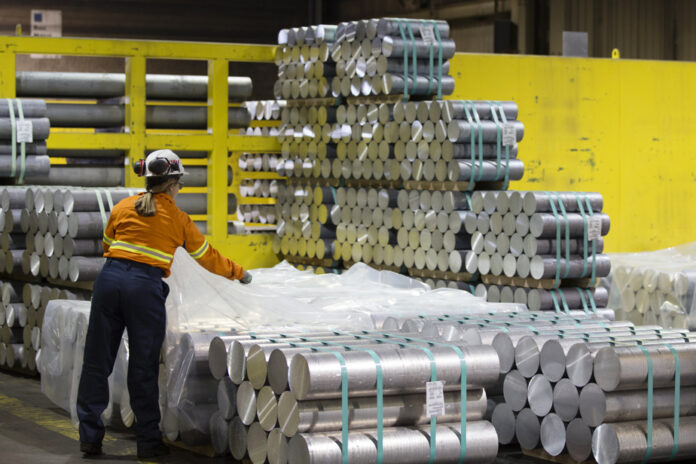Rio Tinto confirms that it will build a total of 96 AP60 technology tanks in Saguenay. The project was long overdue in the region while the closure of its pre-fired vats at Arvida scheduled for 2025 raised concerns over jobs.
The project, which would contribute to the annual production of approximately 160,000 metric tons of primary aluminum, represents an investment of 1.4 billion at the Jonquière Complex. “This is Rio Tinto’s largest investment in Quebec, but also in the West, for a decade,” said Rio Tinto CEO Jakob Stausholm at a press conference on Monday.
Rio Tinto had built 38 AP60 tanks in 2013, but low aluminum prices prompted the company to postpone a decision to add more.
Investments by Rio Tinto are being closely watched in the region while the closure of pre-fired tanks at Arvida scheduled for 2025 could affect between 300 and 350 people.
The new smelter, for its part, will create 100 permanent jobs. “We have more jobs than that at Arvida,” acknowledges Rio Tinto Aluminum’s Executive Director of Atlantic Operations, Sébastien Ross.
However, he recalls that the company has a billet plant project in Alma, announced last summer, which will create 45 jobs. The potential development of commercialization of the new carbon-neutral Elysis technology in the region could also require hiring. “It is with all its parameters that we will work to have this in a harmonious way and ideally not having to lay off anyone. »
The new AP60 plant could be ready by the first half of 2026, Ross said. The schedule exceeds that of the closure of the pre-cooked vats, in 2025. The director raised the possibility of closing three vats after this deadline, dictated by the government for environmental reasons, to ensure a “smooth” transition.
Questioned on the subject, the Minister of Economy, Innovation and Energy, Pierre Fitzgibbon, confirmed that this question is on the table and that discussions are taking place with the Minister of the Environment, Benoit Charette. .
The Quebec government’s $150 million forgivable loan tied to the investment announced Monday will be conditional on maintaining jobs, Fitzgibbon said. The details of the deal have yet to be “finalized” and will take into account the closure of pre-fired vats and investments.
The agreement between the company and the Legault government also provides more details on the company’s electricity rates. They will be similar to rate L for new tanks.
Arvida National Union of Aluminum Employees President Donat Pearson welcomed the “long-awaited” announcement. “For me, it’s a day of celebration. I will leave Sébastien (Ross) alone with the other projects: my requests for dates, information so that we can move forward with the projects, but we will resume that in the next few days. »
The future of Elysis
The company claims that the use of AP60 technology will reduce greenhouse gas emissions by 50% compared to the old tanks at the Arvida plant.
The decarbonization of the aluminum industry is the cornerstone of Québec’s strategy to ensure the sustainability of the sector.
The Quebec aluminum industry has the particularity of being less polluting than elsewhere thanks to hydroelectricity, but it remains a major emitter of greenhouse gases (GHGs).
The sector remains the largest industrial emitter in Quebec. In 2020, the aluminum industry emitted 42% of industrial sector emissions, or 5.18 million tonnes of carbon dioxide equivalent in 2020, according to the most recent Quebec inventory of greenhouse gas emissions.
Beyond the AP60 technology, the government is pinning a lot of hope on the Elysis technology. The Elysis industrial research and development center, a company jointly owned by Alcoa and Rio Tinto, is working on the development of carbon-neutral aluminum in Quebec.
However, the two companies have not confirmed that commercial production will take place in Quebec. Remarks by the chief executive of the aluminum division of Rio Tinto, Ivan Vella, suggesting that the Quebec tanks could be too old resurfaced in February, casting doubt on the future of this sector. The company had, however, specified that it was still aiming for a first deployment in Quebec.
Without going into details, the Prime Minister, François Legault, also wanted to be reassured about the future of Elysis. Discussions would be “very advanced” for a possible commercialization in Quebec, he says.















